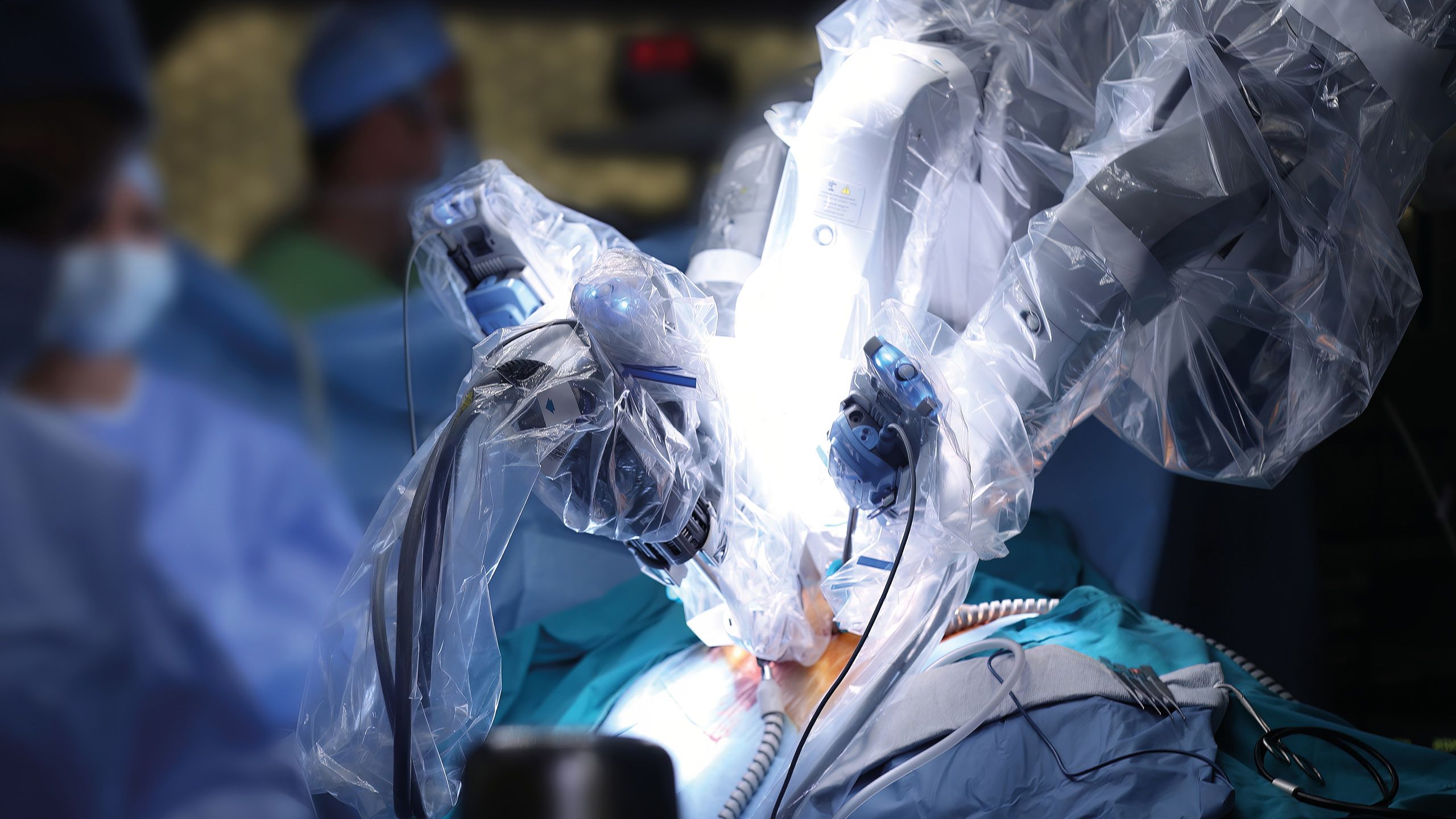Precision thinking
The College’s Robotics Taskforce leads the way as we work with new technologies

Surgeons love technology and innovation. Since the introduction of laparoscopic surgery in the late 1980s the newest advance is in the field of robot-assisted surgery (RAS). The reported advantages of RAS are that complex surgery can be performed with more precision, flexibility and control than is possible with conventional techniques. Although commonly considered a ‘minimally invasive’ technique for intracavity procedures such as abdominal or thoracic surgery, it is also used for certain traditional open surgical procedures in, for example, orthopaedic and head and neck surgery.
In recent years there has been an improvement in instrument technology, an increasing number of vendors and different models appearing on the market, alongside an enthusiasm from surgeons and patients wanting to explore the utility of this technology, resulting in exponential growth in the utilisation of RAS.
Proceed with caution
Many advantages are documented for robotic surgery, but the introduction of innovative new technology must be done safely, otherwise patient safety can be compromised. When laparoscopic gallbladder surgery was introduced in the late 1980s, for example, this led to a two-fold increase in major bile duct injuries.
For this reason, in 2021 RCSEd Office-Bearers and Council set up a Robotics Taskforce to consider the role we, as a College, had in education, training and setting standards. This group included a Vice-President, representatives from each of the 10 surgical specialties, the College Lead for Simulation, the College Lead for NOTSS, the Convenor and Deputy Convenor of Education, a Scottish Clinical Leadership Fellow and staff from the Education Department.
The taskforce drew up and prioritised an initial task list. What was apparent was that there was no UK-based guidance document with regard to setting up a new robotic service and so this became the top priority.
I am extremely grateful to RCSEd Honorary Treasurer Siong Liau for taking the lead on this with contributions and input from numerous others. It was subsequently endorsed by the 10 RCSEd Surgical Specialty Boards representing each of the 10 surgical specialties, as well as the Faculty of Perioperative Care.
When the taskforce was established robotic urological programmes (especially in robotic-assisted prostatectomy) had already been implemented in many centres in the UK and internationally – indeed many had also undergone iterative improvements of a mature service. In other specialties RAS was still limited, but was being increasingly embraced.
Guidance for core training
As with the introduction of any new surgical procedures, patient safety is of paramount importance and it was felt essential that we as a college should provide guidance to enable safe adoption of RAS. The published guidance document provides a practical toolkit for individual hospitals to use when setting up a new robotic surgical service.
The published guidance document, accessed left via the QR code, provides a practical tool kit for hospitals to use when setting up a new robotic surgical service.
It provides comprehensive generic recommendations covering areas of training and clinical governance relevant to all surgical specialties, and aims to help the multidisciplinary team develop safe practices and setup before embarking on clinical cases for the first time. It highlights the importance of case selection for embarking on a new robotic service, obtaining consent, proctorship and the requirement to audit activity and outcomes.
Additional workstreams taken forward by the Robotic Taskforce have been the development of ‘hands-on’ training courses, facilitating an extensive webinar series and development of specific robotic training Fellowships. The ‘Essentials in Robotics’ course is aimed at core trainees, and provides an introduction to the equipment and teaching of some basic technical skills.
Specialist development
More advanced specialty- and procedure-specific courses are also in development. We are working on a collaborative project with NHS Education for Scotland, the Royal College of Physicians and Surgeons of Glasgow, the NHS Scotland Academy and Intuitive to launch a systematic training programme for trainees in Scotland.
The first phase of this will focus on training urology, thoracic and designated colorectal trainees in a modular fashion. This will include online modules, video observation, participation in a guided system in-service, and practice on a robotic simulator to develop proficiency in core technical robotic skills before progressing to act as bedside assistant and performing console surgery in due course. It is anticipated that this will be rolled out over the next two to three years.
“Rolling out a systematic, country-wide training scheme will lay the foundations for the future embedding of robotic skills in training programmes”
In the meantime, many trainees are seeking post-CCT Fellowships and developing their skills with focused placements both within the UK and internationally. Again, this is something the College is aiming to facilitate by partnering with other organisations and international centres of expertise.
I am delighted that Chelliah Selvasekar, Immediate Past-Convenor of Education, has taken over the Chair of the Robotics Taskforce, and with his drive and enthusiasm will continue to coordinate the diverse activities in the field of robotic surgery.
Professor Rowan Parks
president@rcsed.ac.uk
|
References Click here to see the RCSEd’s Development of New Robotic Surgical Services: |

